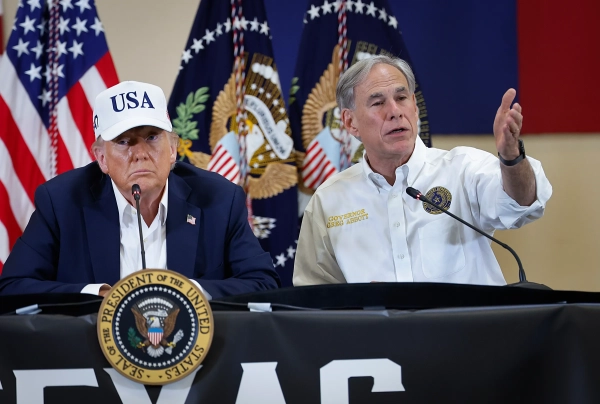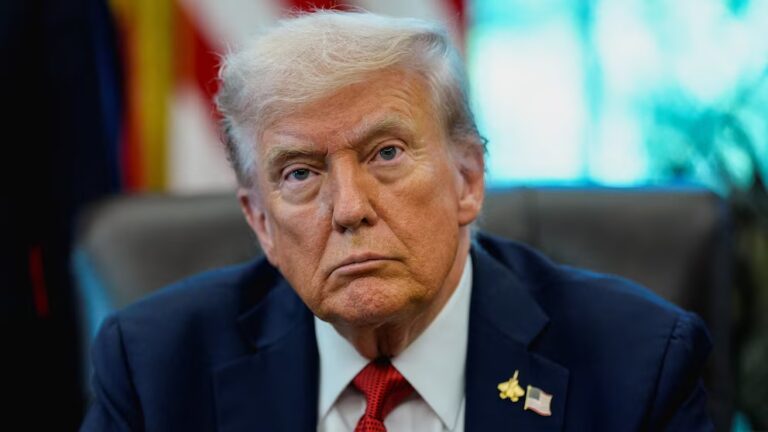
Democracy’s a pretty simple concept: Voters vote for a politician, the politician with the most votes wins, and that politician then represents voters as an elected official. That’s the idea anyway, right?
But what if — just what if — instead of voters picking politicians, politicians instead could choose their own voters? And basically guarantee their own outcomes?
That’s what’s at play in Texas. Facing such a situation, Texas Democratic lawmakers fled the state Sunday to block passage of a new congressional map designed to regroup Texas voters to all but guarantee the GOP five additional seats in the US House of Representatives next year. Republicans currently have a seven-seat advantage.
It’s a move that has set off a national fight over redistricting ahead of 2026’s midterm elections.
Facing a potentially difficult cycle for Republicans, President Donald Trump demanded Texas remake its maps to boost Republicans’ chances of holding — and expanding — their slim majority in Congress. Texas Democrats have condemned the new maps as a political power grab; their flight from the state prevents the legislature from having enough votes to function.
Gov. Gregg Abbott and Republican state lawmakers have since threatened Democrats with arrest and declaring their seats vacant. US Sen. John Cornyn is seeking to enlist the FBI to find Texas lawmakers who have left the state.
Things are messy and only getting messier.
To understand the showdown in Texas — and its stakes for the rest of the country — Today, Explained co-host Sean Rameswaram spoke with Texas Tribune’s Eleanor Klibanoff.
Below is an excerpt of their conversation, edited for length and clarity. There’s much more in the full podcast, so listen to Today, Explained wherever you get podcasts, including Apple Podcasts, Pandora, and Spotify.
Eleanor Klibanoff: So this is something we started hearing about a couple of weeks ago. We heard that President Trump was asking Texas to consider redrawing its congressional maps to strengthen the GOP majority in the House ahead of the 2026 election.
The Texas House has a proposed redraw of the map that tears up a bunch of districts in the Dallas area, the Houston area, the Austin area, as well as the Rio Grande Valley. And based on our initial analysis, it looks like if the 2026 midterms go the way the 2024 election went, they will get five additional seats out of this map. The [Texas] House committee on redistricting held several hearings. … A thousand people showed up in Houston. People submitted comments. They were waiting hours and hours to testify.
The committee votes the map out [for a full legislature vote] on Saturday. On Sunday, they set [that vote] on the calendar for Monday. And Sunday afternoon, the Democrats skip town.
Where did they go?!
Most of them went to Chicago — well, actually, most of them went to the suburbs of Chicago. My colleague who agreed to go out when she thought it was Chicago was disappointed to learn that they were in St. Charles, Illinois, well outside Chicago. So they went there, where they’ve gotten a lot of support from Gov. [J.B.] Pritzker.
Others went to New York, where the governor there has said they will look at redistricting. Some went to Massachusetts. [They are] just sort of fanning out to these Democratic strongholds, essentially.
Do they have to go there because, what, a Republican governor could extradite them back to Texas?
Yes, essentially, they have to leave the state. The [state] House of Representatives, in their absence, voted to issue arrest warrants for them that basically say: We will send state troopers to your house or we’ll try to track you down. If we find you, we will bring you to the Capitol, and then you cannot leave.
These are not criminal arrest warrants. It doesn’t go on their record, but it’s to go find them and bring them [back]. But these warrants only extend to state lines. So they have to leave the state for fear that they will be brought back.
Of course, there is a federal police force. I believe it’s called the FBI, and the latest news is that the FBI might actually get involved here.
Certainly, there has been some chatter about that. Our sitting Senator John Cornyn has asked for the FBI to get involved. President Trump sort of alluded to maybe that being necessary.
That would be an extraordinary step if that were to happen. I’m willing to believe that by the time this airs, it may have happened. I don’t think it’s out of the realm of possibility, but Texas is a state that pretty proudly likes to manage its own business itself and keep the federal government out of its affairs. So it would be quite the reversal to allow the federal government to arrest its lawmakers and bring them back to Texas.
This is obviously an extreme moment for Texas politics, but it’s also not an unprecedented one. As I recall, Texas Democrats have fled the state before, right? Can you remind us under what circumstances and how it ended?
Recently, they left the state in 2021, to protest a bill that would have further restricted voting access. That was during the Biden administration, kind of a different vibe in DC. They stuck it out there. They burned through one special session, but when the second special session was called, they did end up returning, and ultimately it did pass. And then in 2003, they left the state to do a quorum break on this exact issue, which is a mid-decade redistricting.
So there is precedent for this to happen. I think what’s unprecedented about this is A) the pressure for the legislation that they’re protesting is coming from the federal government, and B) the way Texas Republican leaders are responding with this very — usually they just kind of wait it out, and eventually the quorum break breaks, and that is not how this is going.
How did it go back in 2003 when almost the same thing happened?
Eventually, the quorum break broke, and they came back and they passed the maps, and that was the beginning of Republican dominance in Texas. The reason they did mid-decade redistricting in 2003 at all was because [Republicans] had just won the [state] House and the Senate for the first time. So they took the opportunity, redrew maps that benefited them, and from there on out, we have seen basically unfettered Republican dominance in Texas.
So the Democrats who just fled and are in Chicago and other spots…
Yes.
…the Chicago suburbs, we should note. They know that the last time they gave in on this issue, they forever altered their chances of dominating Texas politics.
Does that mean they’re going to hold out longer this time? Does that mean it’s going to get uglier this time?
If history is any guide, they leave, eventually they come back, and what was going to happen happens. I think they don’t like this narrative that it’s inevitable. If you just wait ‘em out, they’ll come back. It is also just reality, right?These people have jobs they have to go to, and they have kids. I mean, school starts here soon. Are you going to miss the first day of school? Some of them brought their kids with them.
Hm.
And now you’re basically a fugitive from your home state. Texas is a part-time legislature. You make $600 a month, you can’t feed your family and leave your company behind or your business or whatever.
So there are just realities. And the truth is [Republicans] don’t need all of them to break the quorum break. You know, just in the last day here, we’ve had this sort of escalation from Governor Abbott in which he has asked the Texas Supreme Court to vacate the seats of these members who have broken quorum, which is unprecedented, shocking to all the legal experts that I’ve talked to. So there’s both sort of, within Texas, a constitutional crisis, and then of course these national democracy questions about who gets to decide when the rules are set and when you change the rules in the middle of the game.
And then what happens? Republicans aren’t necessarily guaranteed these five seats, but they’ll probably get ’em?
Right. So if the quorum break ends in one way or another, they absolutely will pass the map. We’ll have the midterms in 2026. These districts seem very likely to go for Republicans based on 2024 performance.
But 2024 was a pretty exceptional year in Texas, most notably that we saw Latino voters swing so far for President Trump compared to historical precedent. And a lot of these maps are based on the idea that those same voters will go for Republican candidates across the board in 2026.
Now, President Trump is not on the ballot in 2026. It remains to be seen whether Latino voters are thinking, This is what I voted for and I love this, or if there’s any buyer’s remorse that might turn some of those seats a little bit more competitive than you would think.
It’s also not guaranteed that Donald Trump gets his five Republican districts, because now that Texas is going this route, governors like Gavin Newsom in California are threatening revenge.
Right. We have basically a redistricting arms race afoot now, and you’ve got governors in California, New York, and Illinois saying, “Maybe we’ll take a look at our maps.”
But then you also have President Trump saying, “Well, then I’ll get Missouri to take a look at their maps.” Now, suddenly, we are in a mess of a situation. You’ve got even some Republican lawmakers in Congress talking about legislation to basically say, “we have to stop this before it gets on top of us.”
Part of the reason why this is happening in Texas first is that we’re very large, and so you can get five seats in a way that some states don’t even have five seats [total]. But also, our filing deadline [for candidates to run] is very, very early, and so this is just sort of a testing ground in Texas. There’s no reason to believe that with President Trump, five seats will be enough and that he will stop there versus trying to get other states to redistrict as well.
Source: vox.com






